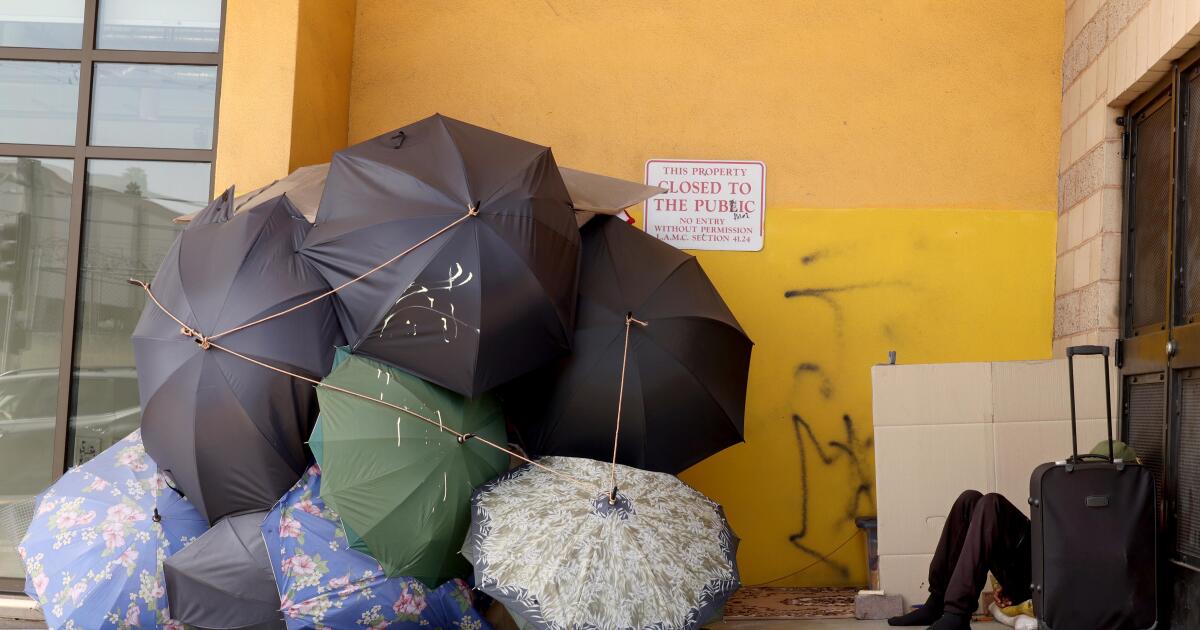
WASHINGTON — President-elect Donald Trump has promised to arrest thousands of homeless people sleeping in American streets and move them to large tent cities on “inexpensive land,” one of several planks of his agenda that would upend a national strategy that focuses on finding people housing on a voluntary basis. “We will use every tool, lever and authority to get the homeless off our streets,” Trump said in a video announcing his policy last year. “There is nothing compassionate about letting these individuals live in filth and squalor, rather than getting them the help that they need.
” Homeless advocates, who have fought for decades to remove the stigma around people who lack a place to live, are bracing for a multi-pronged battle against policies they deem inhumane. But Los Angeles Mayor Karen Bass, who is trying to combat one of the nation’s largest homelessness crises, said she is eager to work with the incoming administration, and believes she and Trump can find common ground in housing the city’s estimated 46,000 homeless people. “I’m certainly going to begin that way,” said Bass, a Democrat who was sworn into office by Vice President Kamala Harris , in an interview.
“Over the years that I spent in Congress — 12 years that I spent in Congress — I have very significant Republican relationships.” The city doesn’t have cheap or remote land, and Bass does not believe she would need to use more aggressive tactics to get people off the street, she said. But she would be eager to use federal property for temporary shelters — as some Trump administration officials proposed during his first term in office — Bass said.
“We’re on the same page on that,” Bass said, suggesting the city could erect shipping containers or other modular units for more stable forms of housing rather than tent cities. Bass is trying to navigate a shifting political terrain around homelessness, as public sentiment and a recent Supreme Court decision have opened the door for cities and states to take more punitive actions against a homeless population that has swelled in recent years amid rising housing costs. “The ground is fertile,” said Jesse Rabinowitz, campaign and communications director for the National Homelessness Law Center, which fights laws aimed at criminalizing homelessness.
Trump has not yet chosen a housing secretary and his transition team’s statement to The Times did not answer specific questions about his plans. “The American people reelected President Trump by a resounding margin, giving him a mandate to implement the promises he made on the campaign trail, like lowering housing costs for all Americans. He will deliver,” said Karoline Leavitt, the Trump-Vance transition spokesperson.
But homeless experts and advocates who have reviewed public statements from Trump and his closest advisors and donors have identified a number of possible changes. They include more aggressive policing, less funding for some low-income housing and shelter programs, a return to forced institutionalization of people with substance and mental health problems and an end to the national strategy that seeks to house people without imposing conditions such as sobriety, mental health treatment or participation in religious-based treatment programs. “Everybody’s just trying to assess what we should do next,” said Sharon Rapport, director of California state policy for the Corporation for Supportive Housing, an advocacy group that also works with homeless nonprofits.
Trump campaigned in large part on the idea that cities have become chaotic and unruly and that he could impose more order by cracking down on homeless encampments and open drug use. “We have horrible, disgusting, dangerous, filthy encampments of junkies and homeless people living in places that our children used to play Little League baseball, which they don’t get to play very much anymore, do they?” Trump said at a rally in Uniondale, N.Y.
, in September. Nationally, more than 650,000 people were estimated to be homeless on a single night in 2023, according to the most recent data available. Of those, more than 250,000 were unsheltered.
California has the largest homeless population, at more than 180,000. Such counts are widely believed to underestimate the true number of homeless people. Though many homeless people struggle with addiction and mental illness, the strongest driver of homelessness is the lack of affordable housing, research shows.
West Virginia, for example, has the highest opioid death rate but its homeless population is a fraction of California’s, even when accounting for its small population. Mississippi, despite extremely high poverty, has one of the nation’s lowest rates of homelessness. But addiction, mental illness and poverty can make it harder for people to come out of homelessness.
Most of the country’s homeless policy is organized around the principle called “housing first,” which means allowing people into housing without demanding sobriety, mental health treatment or religious-based treatment. The theory is that many homeless people do not need additional services and those who do are more likely to accept them once they are off the street, given the stress caused by living without shelter. But the sense of disorder created by open drug use and street camping has prompted an increasing number of cities to crack down on homeless people with more laws that allow removing and arresting them.
Even liberal politicians such as California Gov. Gavin Newsom have begun ordering more aggressive tactics to clear encampments. And the Supreme Court ruled in June that cities can enforce camping bans, even if they lack shelter space for homeless people.
Trump, whose Republican Party will control both the House and Senate in January, has said that he will seek a national ban on urban camping. Violators would be given a choice to accept services or be forcibly located to tent cities, where doctors and other specialists would assess their needs, he has said. It’s unclear whether Trump could actually accomplish this part of his plan without local and state cooperation.
Federal park police can arrest people on federal lands but Trump would probably need city and county police to enforce camping bans in most areas of the country. Trump floated a similar proposal to Los Angeles during his first term, including the use of federal land for temporary homeless shelters. But it broke down, in part because city and state officials would not agree to his demands to forcibly clear Skid Row and other encampments.
Rabinowitz predicted that Trump would probably start building tent cities in more conservative states such as Florida, which passed a statewide camping ban that took effect in October. Devon Kurtz, public safety director for the conservative Cicero Institute, said designated camping sites offer an effective way to reach those people who resist shelters, by bringing traveling teams of doctors and social workers to a central location. “It’s a lot easier to do that, and really the only way you’ll be able to do that, is if everyone is in one place,” he said.
The Cicero Institute, which has been active in promoting the passage of laws that crack down on camping throughout the country, was founded in 2018 by Joe Lonsdale, a venture capitalist who has donated more than $1 million to Trump’s campaign. Kurtz said he also sees other changes in store, including laws that could set the table for committing more people into mental health institutions and using more federal housing money for local homeless programs that force people to stay sober or set other lifestyle requirements as a condition of housing. “It’s unlikely that the pot of money shrinks and I think there’s even a possibility it could increase,” he predicted.
But homeless advocates worry Trump could cut programs, including housing vouchers that supply California with about $5.6 billion a year to place low-income people into homes, or Medicaid, which funds some housing programs that include social services. More broadly, they argue that Trump’s approach will strip homeless people of dignity and liberty for the crime of having nowhere to live, removing them from public view without increasing the affordable housing supply.
They argue that focusing on housing people regardless of their sobriety status has led to successes, like a recent drop in veteran homelessness, that would be undermined if Trump reverses course. ”We know from years and years of evidence that requiring somebody to get well, get sober, before they can access housing just means more people are going to fall down on that journey before they get back into housing,” said Alex Visotzky, senior California policy advisor for the National Alliance to End Homelessness. Though cities and states set their own homeless policies, the federal government controls most of the money and can shift the balance by tying grant money to requirements that force localities to shift tactics.
“We are concerned about a federal government that gives local governments the green light to follow their worst political instinct, instead of what we know works,” Visotzky said..














